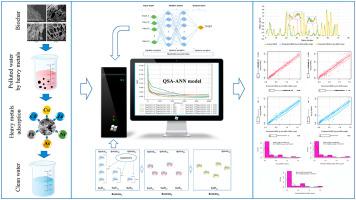Chemosphere ( IF 8.8 ) Pub Date : 2021-09-20 , DOI: 10.1016/j.chemosphere.2021.132251 Xiaolei Zheng 1 , Hoang Nguyen 2

|
This study aims at providing a robust artificial intelligent model for predicting the efficiency of heavy metal removal from aqueous solutions of biochar systems with high accuracy and reliability. Not only is it environmentally significant, but it is also a powerful tool for improving biochar adsorption efficiency, reducing the risk of a global water shortage. Accordingly, 22 types of biomass feedstock with a total of 44 biochar systems and 353 experiments, aiming to remove six heavy metal ions (i.e., Cu2+, Pb2+, Zn2+, As3+, Cd2+, and Ni2+) from water were considered and evaluated. Subsequently, an artificial neural network (ANN) model was designed for predicting the heavy metal adsorption efficiency onto these biochar systems. To improve the accuracy of the ANN model, the queuing search algorithm (QSA), a human activities-based algorithm, was applied, aiming to optimize the parameters of the developed ANN model, called the QSA-ANN model. The results showed that the proposed optimization QSA-ANN model provided high accuracy with a root-mean-squared error (RMSE) of 0.051 and 0.074; determination coefficient (R2) of 0.978 and 0.960; variance accounted for (VAF) of 97.707 and 95.882, for the training and testing phases, respectively. Compared to the traditional ANN model, the accuracy of the proposed optimization QSA-ANN model was improved 2.7% on the training dataset and 2.9% on the testing dataset. With an accuracy of 96% in practice, the proposed optimization QSA-ANN model was recommended for practical engineering to predict and improve heavy metal adsorption efficiency onto biochar systems.
中文翻译:

基于人工神经网络和排队搜索算法的新型生物炭系统水处理效率预测人工智能模型
本研究旨在提供一个强大的人工智能模型,以高精度和可靠性预测生物炭系统水溶液中重金属的去除效率。它不仅对环境具有重要意义,而且还是提高生物炭吸附效率、降低全球水资源短缺风险的有力工具。相应地,22种生物质原料共44个生物炭系统和353个实验,旨在去除六种重金属离子(即Cu 2+、Pb 2+、Zn 2+、As 3+、Cd 2+和Ni 2+) 来自水被考虑和评估。随后,设计了人工神经网络 (ANN) 模型来预测重金属在这些生物炭系统上的吸附效率。为了提高 ANN 模型的准确性,应用了排队搜索算法 (QSA),一种基于人类活动的算法,旨在优化开发的 ANN 模型的参数,称为 QSA-ANN 模型。结果表明,所提出的优化 QSA-ANN 模型提供了高精度,均方根误差 (RMSE) 为 0.051 和 0.074;决定系数(R 2) 的 0.978 和 0.960;训练和测试阶段的方差解释 (VAF) 分别为 97.707 和 95.882。与传统的 ANN 模型相比,所提出的优化 QSA-ANN 模型的准确率在训练数据集上提高了 2.7%,在测试数据集上提高了 2.9%。在实践中准确率为 96%,建议将所提出的优化 QSA-ANN 模型用于实际工程,以预测和提高生物炭系统上的重金属吸附效率。


























 京公网安备 11010802027423号
京公网安备 11010802027423号